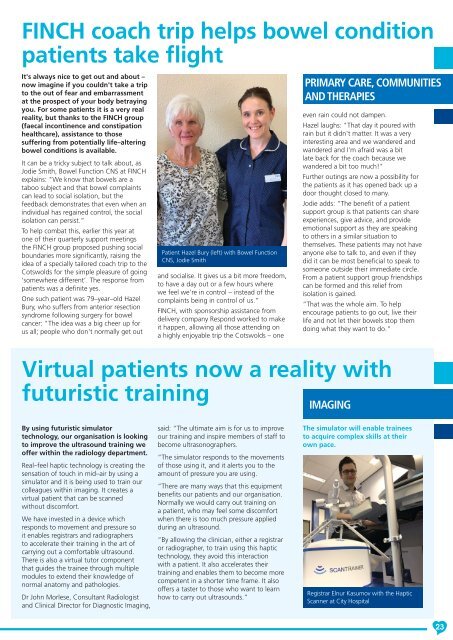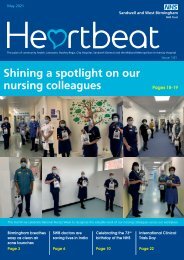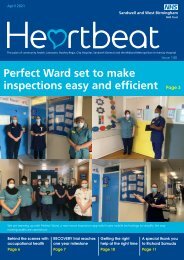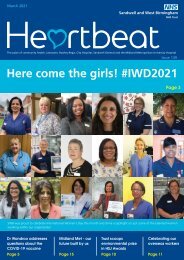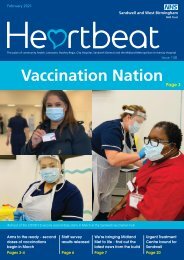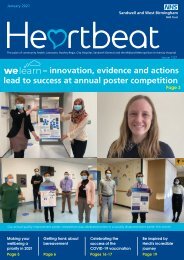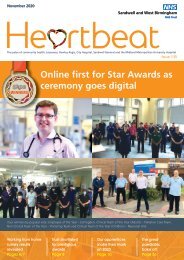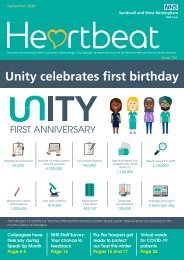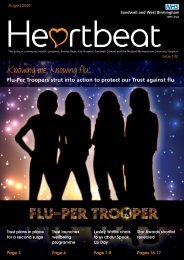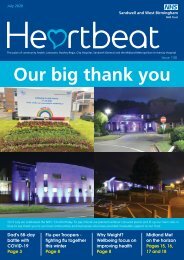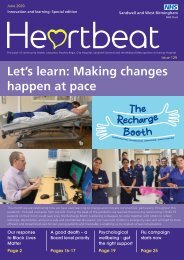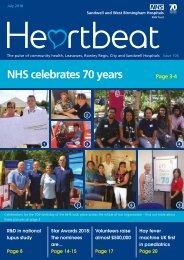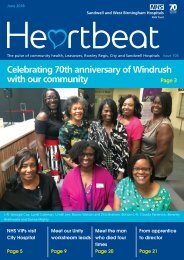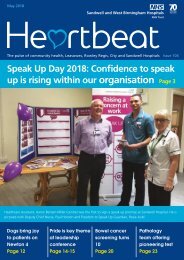Heartbeat: May 2019
You also want an ePaper? Increase the reach of your titles
YUMPU automatically turns print PDFs into web optimized ePapers that Google loves.
FINCH coach trip helps bowel condition<br />
patients take flight<br />
It's always nice to get out and about –<br />
now imagine if you couldn't take a trip<br />
to the out of fear and embarrassment<br />
at the prospect of your body betraying<br />
you. For some patients it is a very real<br />
reality, but thanks to the FINCH group<br />
(faecal incontinence and constipation<br />
healthcare), assistance to those<br />
suffering from potentially life–altering<br />
bowel conditions is available.<br />
It can be a tricky subject to talk about, as<br />
Jodie Smith, Bowel Function CNS at FINCH<br />
explains: "We know that bowels are a<br />
taboo subject and that bowel complaints<br />
can lead to social isolation, but the<br />
feedback demonstrates that even when an<br />
individual has regained control, the social<br />
isolation can persist.”<br />
To help combat this, earlier this year at<br />
one of their quarterly support meetings<br />
the FINCH group proposed pushing social<br />
boundaries more significantly, raising the<br />
idea of a specially tailored coach trip to the<br />
Cotswolds for the simple pleasure of going<br />
‘somewhere different’. The response from<br />
patients was a definite yes.<br />
One such patient was 79–year–old Hazel<br />
Bury, who suffers from anterior resection<br />
syndrome following surgery for bowel<br />
cancer: "The idea was a big cheer up for<br />
us all; people who don't normally get out<br />
Patient Hazel Bury (left) with Bowel Function<br />
CNS, Jodie Smith<br />
and socialise. It gives us a bit more freedom,<br />
to have a day out or a few hours where<br />
we feel we're in control – instead of the<br />
complaints being in control of us.”<br />
FINCH, with sponsorship assistance from<br />
delivery company Respond worked to make<br />
it happen, allowing all those attending on<br />
a highly enjoyable trip the Cotswolds – one<br />
PRIMARY CARE, COMMUNITIES<br />
AND THERAPIES<br />
even rain could not dampen.<br />
Hazel laughs: "That day it poured with<br />
rain but it didn't matter. It was a very<br />
interesting area and we wandered and<br />
wandered and I'm afraid was a bit<br />
late back for the coach because we<br />
wandered a bit too much!"<br />
Further outings are now a possibility for<br />
the patients as it has opened back up a<br />
door thought closed to many.<br />
Jodie adds: "The benefit of a patient<br />
support group is that patients can share<br />
experiences, give advice, and provide<br />
emotional support as they are speaking<br />
to others in a similar situation to<br />
themselves. These patients may not have<br />
anyone else to talk to, and even if they<br />
did it can be most beneficial to speak to<br />
someone outside their immediate circle.<br />
From a patient support group friendships<br />
can be formed and this relief from<br />
isolation is gained.<br />
“That was the whole aim. To help<br />
encourage patients to go out, live their<br />
life and not let their bowels stop them<br />
doing what they want to do."<br />
Virtual patients now a reality with<br />
futuristic training<br />
IMAGING<br />
By using futuristic simulator<br />
technology, our organisation is looking<br />
to improve the ultrasound training we<br />
offer within the radiology department.<br />
Real–feel haptic technology is creating the<br />
sensation of touch in mid–air by using a<br />
simulator and it is being used to train our<br />
colleagues within imaging. It creates a<br />
virtual patient that can be scanned<br />
without discomfort.<br />
We have invested in a device which<br />
responds to movement and pressure so<br />
it enables registrars and radiographers<br />
to accelerate their training in the art of<br />
carrying out a comfortable ultrasound.<br />
There is also a virtual tutor component<br />
that guides the trainee through multiple<br />
modules to extend their knowledge of<br />
normal anatomy and pathologies.<br />
Dr John Morlese, Consultant Radiologist<br />
and Clinical Director for Diagnostic Imaging,<br />
said: “The ultimate aim is for us to improve<br />
our training and inspire members of staff to<br />
become ultrasonographers.<br />
“The simulator responds to the movements<br />
of those using it, and it alerts you to the<br />
amount of pressure you are using.<br />
“There are many ways that this equipment<br />
benefits our patients and our organisation.<br />
Normally we would carry out training on<br />
a patient, who may feel some discomfort<br />
when there is too much pressure applied<br />
during an ultrasound.<br />
“By allowing the clinician, either a registrar<br />
or radiographer, to train using this haptic<br />
technology, they avoid this interaction<br />
with a patient. It also accelerates their<br />
training and enables them to become more<br />
competent in a shorter time frame. It also<br />
offers a taster to those who want to learn<br />
how to carry out ultrasounds.”<br />
The simulator will enable trainees<br />
to acquire complex skills at their<br />
own pace.<br />
Registrar Elnur Kasumov with the Haptic<br />
Scanner at City Hospital<br />
23


